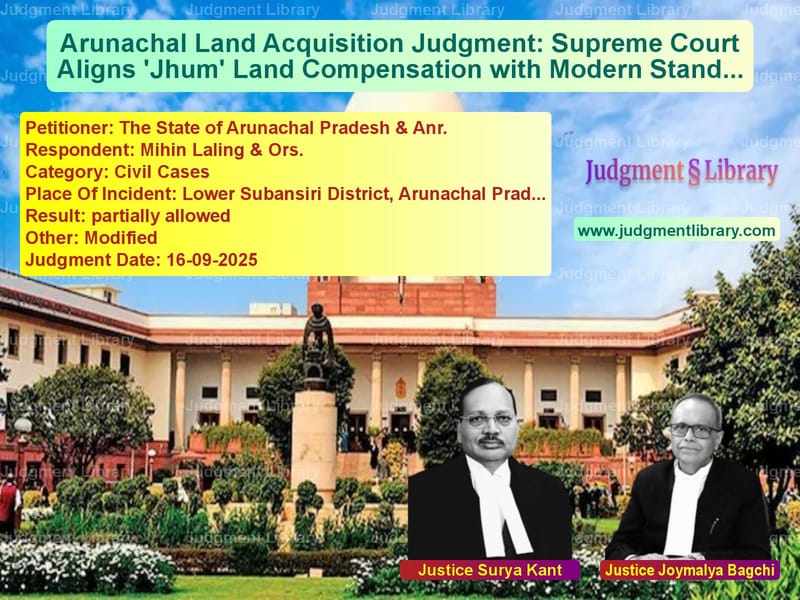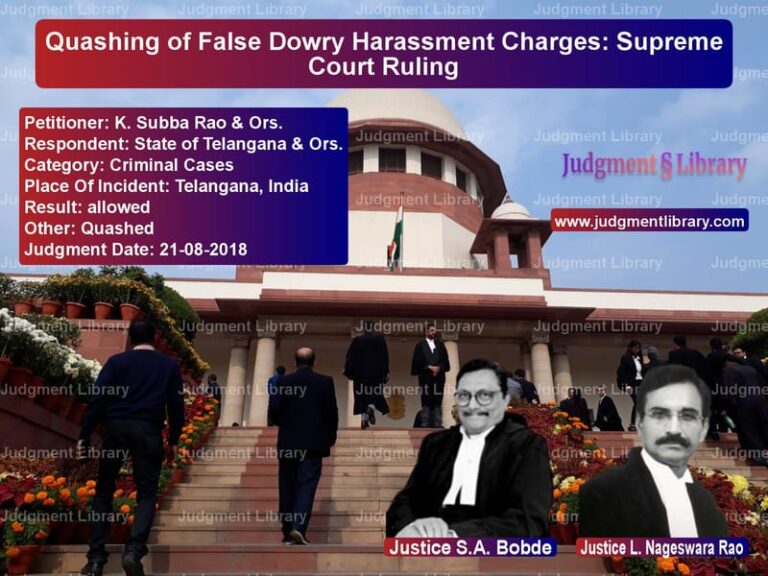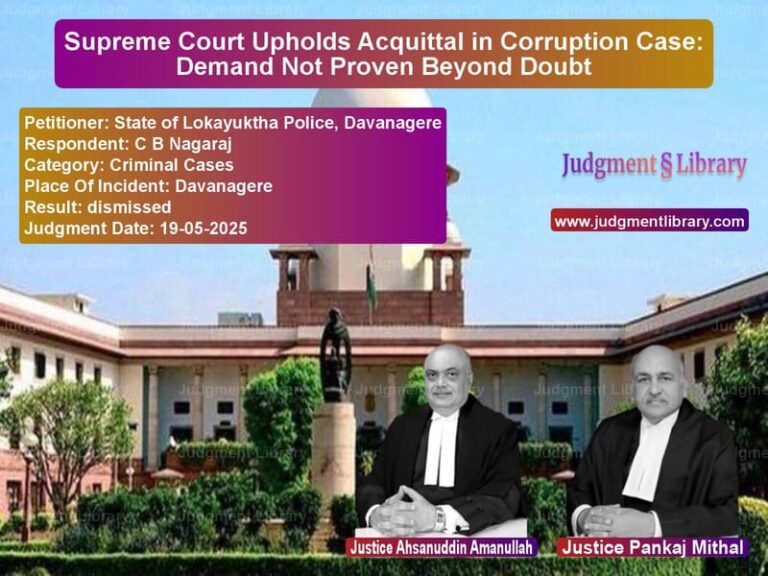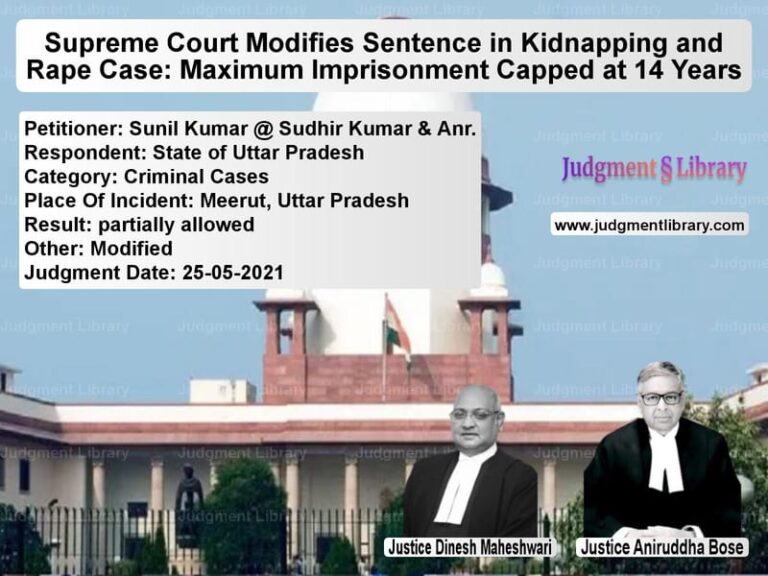Arunachal Land Acquisition Judgment: Supreme Court Aligns ‘Jhum’ Land Compensation with Modern Standards
The Supreme Court of India delivered a landmark judgment on September 16, 2025, in the case of The State of Arunachal Pradesh & Anr. vs. Mihin Laling & Ors. The case revolved around the acquisition of ‘Jhum’ lands in Arunachal Pradesh and the conflict between a colonial-era regulation and the modern compensation framework under the Right to Fair Compensation and Transparency in Land Acquisition, Rehabilitation and Resettlement Act, 2013. This judgment holds significant implications for tribal land rights and the principle of equitable compensation.
Background of the Dispute
The controversy emerged when the Government of Arunachal Pradesh acquired certain ‘Jhum’ lands under the Balipara/Tirap/Sadiya Frontier Tract Jhum Land Regulation, 1947 (hereinafter ‘1947 Regulations’) for the construction of the Trans-Arunachal Highway along the Potin–Bopi (Godak) corridor. The affected landowners were notified on February 17, 2014, under Section 10 of the 1947 Regulations, which allowed acquisition for public purposes upon payment of “reasonable compensation.”
However, the compensation did not include solatium or interest as mandated under the 2013 Act. The landowners challenged this omission before the Deputy Commissioner of Lower Subansiri District, who rejected their plea. The matter escalated through multiple levels—Governor, Single Judge, and Division Bench of the Gauhati High Court—before finally reaching the Supreme Court.
Arguments of the Parties
Petitioners (State of Arunachal Pradesh): The State contended that the acquisition was validly undertaken under the 1947 Regulations, a special law enacted under Section 92(2) of the Government of India Act, 1935, designed specifically to govern tribal areas. They argued that the 2013 Act did not apply to such acquisitions and that “reasonable compensation” need not include statutory benefits like solatium or interest.
Respondents (Landowners): The respondents, represented by learned counsel Mr. Abhimanyu Tewari, argued that denying solatium and interest violated the constitutional guarantees of equality and fairness. They claimed that the term “reasonable compensation” under Section 10 of the 1947 Regulations must be interpreted in harmony with the standards set by the 2013 Act, which embodies modern principles of fair compensation.
Supreme Court’s Observations
The Bench comprising Surya Kant and Joymalya Bagchi examined the legislative intent and constitutional context of both statutes. The Court observed that while the 1947 Regulations were enacted to protect tribal land rights and simplify acquisition processes, they could not override the evolving constitutional guarantees of fairness and equality.
Quoting directly from the judgment, the Court held: “The phrase ‘reasonable compensation’ is an open-textured expression, designed to confer flexibility. It cannot be read as permitting compensation which is merely notional or arbitrary.” The Bench emphasized that any deprivation of property under Article 300A must meet the tests of fairness and non-arbitrariness.
The judges further observed that: “To construe ‘reasonable compensation’ narrowly, ignoring ‘solatium’ and ‘interest’, would be to perpetuate inequality: two landholders losing their property for identical projects — one under the 2013 Act, another under the 1947 Regulations — would stand on palpably different footings, without rational justification.”
This reasoning underscored the Court’s view that the right to property, though no longer a fundamental right, remains a constitutional right that must be protected through equitable treatment.
Interpretation of the 1947 Regulations
The Supreme Court examined Section 10 of the 1947 Regulations, which permits the government to acquire Jhum lands without formal proceedings but mandates payment of “reasonable compensation.” The Court clarified that this provision must now be read in light of the 2013 Act and constitutional principles.
The Bench held that while the 1947 Regulations are a special law for frontier tracts, the meaning of “reasonable compensation” must evolve with time. Therefore, the term encompasses not only market value but also solatium and interest as recognized in the 2013 Act.
Read also: https://judgmentlibrary.com/supreme-court-overturns-11-year-delay-condonation-in-land-dispute-case/
Limits of Judicial Intervention
The Court acknowledged that it could not reopen all past acquisitions, as doing so would undermine administrative finality and destabilize completed projects. Hence, the Bench ruled that the new interpretation would apply only to pending and future acquisitions under the 1947 Regulations.
It observed: “Finality of administrative action cannot be lightly unsettled; to do so would not only destabilise public projects but also create fiscal uncertainty.”
Legislative Amendment Confirms the Interpretation
The judgment noted that the controversy had already been addressed by legislative amendment. The Balipara/Tirap/Sadiya Frontier Tract Jhum Land Regulation (Amendment) Act, 2024 (Act No. 11 of 2024), effective from August 7, 2024, added a proviso to Section 10 clarifying that compensation shall not be less than that under the prevailing land acquisition laws. The Court recognized this amendment as confirmation of its interpretive approach, while emphasizing that it applies prospectively.
Final Directions of the Supreme Court
After extensive deliberation, the Supreme Court partly allowed the appeals. The operative portion of the judgment directed the following:
“The respondents shall also be entitled to solatium as well as interest in accordance with the provisions of the 2013 Act.”
The Court instructed the appellants to release any unpaid solatium and interest to the affected landowners within three months. It also clarified that the State could recover such amounts from the ultimate beneficiaries of the acquisition if permissible by law. However, concluded acquisitions with finalized compensation would not be reopened.
Significance of the Judgment
This judgment is a milestone for equitable treatment of tribal landowners in the North-East. It harmonizes pre-independence special laws with the modern compensation framework of the 2013 Act. By reading “reasonable compensation” in the light of contemporary legal standards, the Supreme Court ensured that no citizen loses land for public purposes without fair recompense.
The Court’s nuanced balance between equity and administrative finality reflects judicial restraint and progressive interpretation. It demonstrates how constitutional values continue to guide even the oldest special laws governing India’s unique regions.
In essence, this decision reinforces the idea that fairness in compensation is not merely statutory but constitutional. The recognition of solatium and interest under the 2013 Act as part of “reasonable compensation” marks a decisive shift toward justice for tribal communities affected by development projects.
Petitioner Name: The State of Arunachal Pradesh & Anr..Respondent Name: Mihin Laling & Ors..Judgment By: Justice Surya Kant, Justice Joymalya Bagchi.Place Of Incident: Lower Subansiri District, Arunachal Pradesh.Judgment Date: 16-09-2025.Result: partially allowed.
Don’t miss out on the full details! Download the complete judgment in PDF format below and gain valuable insights instantly!
Download Judgment: the-state-of-arunach-vs-mihin-laling-&-ors.-supreme-court-of-india-judgment-dated-16-09-2025.pdf
Directly Download Judgment: Directly download this Judgment
See all petitions in Property Disputes
See all petitions in Landlord-Tenant Disputes
See all petitions in Damages and Compensation
See all petitions in Contract Disputes
See all petitions in Judgment by Surya Kant
See all petitions in Judgment by Joymalya Bagchi
See all petitions in partially allowed
See all petitions in Modified
See all petitions in supreme court of India judgments September 2025
See all petitions in 2025 judgments
See all posts in Civil Cases Category
See all allowed petitions in Civil Cases Category
See all Dismissed petitions in Civil Cases Category
See all partially allowed petitions in Civil Cases Category







